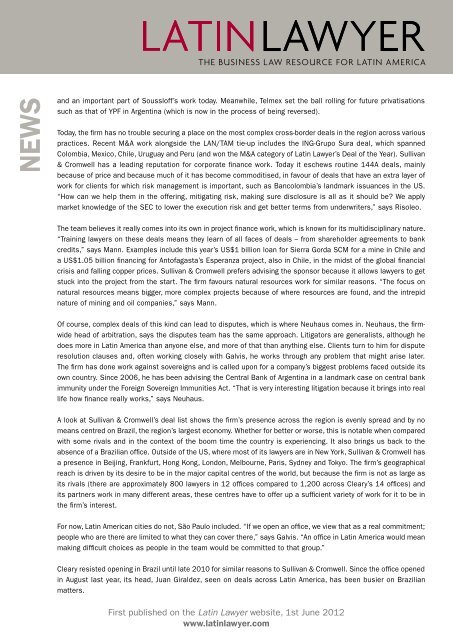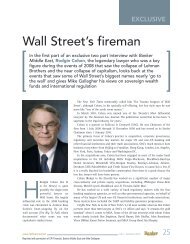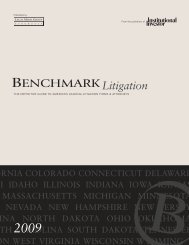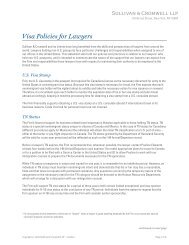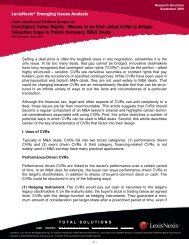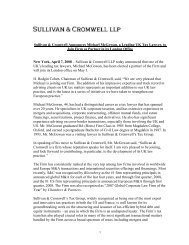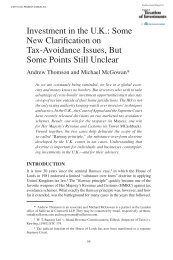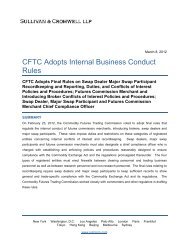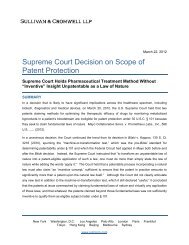THE GENERALISTS - Sullivan & Cromwell
THE GENERALISTS - Sullivan & Cromwell
THE GENERALISTS - Sullivan & Cromwell
You also want an ePaper? Increase the reach of your titles
YUMPU automatically turns print PDFs into web optimized ePapers that Google loves.
news<br />
and an important part of Soussloff’s work today. Meanwhile, Telmex set the ball rolling for future privatisations<br />
such as that of YPF in Argentina (which is now in the process of being reversed).<br />
Today, the firm has no trouble securing a place on the most complex cross-border deals in the region across various<br />
practices. Recent M&A work alongside the LAN/TAM tie-up includes the ING-Grupo Sura deal, which spanned<br />
Colombia, Mexico, Chile, Uruguay and Peru (and won the M&A category of Latin Lawyer’s Deal of the Year). <strong>Sullivan</strong><br />
& <strong>Cromwell</strong> has a leading reputation for corporate finance work. Today it eschews routine 144A deals, mainly<br />
because of price and because much of it has become commoditised, in favour of deals that have an extra layer of<br />
work for clients for which risk management is important, such as Bancolombia’s landmark issuances in the US.<br />
“How can we help them in the offering, mitigating risk, making sure disclosure is all as it should be? We apply<br />
market knowledge of the SEC to lower the execution risk and get better terms from underwriters,” says Risoleo.<br />
The team believes it really comes into its own in project finance work, which is known for its multidisciplinary nature.<br />
“Training lawyers on these deals means they learn of all faces of deals – from shareholder agreements to bank<br />
credits,” says Mann. Examples include this year’s US$1 billion loan for Sierra Gorda SCM for a mine in Chile and<br />
a US$1.05 billion financing for Antofagasta’s Esperanza project, also in Chile, in the midst of the global financial<br />
crisis and falling copper prices. <strong>Sullivan</strong> & <strong>Cromwell</strong> prefers advising the sponsor because it allows lawyers to get<br />
stuck into the project from the start. The firm favours natural resources work for similar reasons. “The focus on<br />
natural resources means bigger, more complex projects because of where resources are found, and the intrepid<br />
nature of mining and oil companies,” says Mann.<br />
Of course, complex deals of this kind can lead to disputes, which is where Neuhaus comes in. Neuhaus, the firmwide<br />
head of arbitration, says the disputes team has the same approach. Litigators are generalists, although he<br />
does more in Latin America than anyone else, and more of that than anything else. Clients turn to him for dispute<br />
resolution clauses and, often working closely with Galvis, he works through any problem that might arise later.<br />
The firm has done work against sovereigns and is called upon for a company’s biggest problems faced outside its<br />
own country. Since 2006, he has been advising the Central Bank of Argentina in a landmark case on central bank<br />
immunity under the Foreign Sovereign Immunities Act. “That is very interesting litigation because it brings into real<br />
life how finance really works,” says Neuhaus.<br />
A look at <strong>Sullivan</strong> & <strong>Cromwell</strong>’s deal list shows the firm’s presence across the region is evenly spread and by no<br />
means centred on Brazil, the region’s largest economy. Whether for better or worse, this is notable when compared<br />
with some rivals and in the context of the boom time the country is experiencing. It also brings us back to the<br />
absence of a Brazilian office. Outside of the US, where most of its lawyers are in New York, <strong>Sullivan</strong> & <strong>Cromwell</strong> has<br />
a presence in Beijing, Frankfurt, Hong Kong, London, Melbourne, Paris, Sydney and Tokyo. The firm’s geographical<br />
reach is driven by its desire to be in the major capital centres of the world, but because the firm is not as large as<br />
its rivals (there are approximately 800 lawyers in 12 offices compared to 1,200 across Cleary’s 14 offices) and<br />
its partners work in many different areas, these centres have to offer up a sufficient variety of work for it to be in<br />
the firm’s interest.<br />
For now, Latin American cities do not, São Paulo included. “If we open an office, we view that as a real commitment;<br />
people who are there are limited to what they can cover there,” says Galvis. “An office in Latin America would mean<br />
making difficult choices as people in the team would be committed to that group.”<br />
Cleary resisted opening in Brazil until late 2010 for similar reasons to <strong>Sullivan</strong> & <strong>Cromwell</strong>. Since the office opened<br />
in August last year, its head, Juan Giraldez, seen on deals across Latin America, has been busier on Brazilian<br />
matters.<br />
First published on the Latin Lawyer website, 1st June 2012<br />
www.latinlawyer.com


